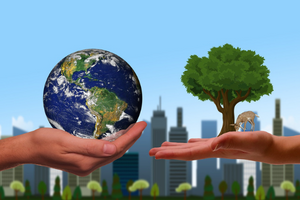TERI partners with SAP for sustainability agenda in India that would engage both private and government sectors to proactively tackle climate change.
The Energy and Resources Institute (TERI), a not-for-profit, policy research organisation based in New Delhi, has been pioneering innovations in the field of energy, environment, and sustainability to usher India’s transition to a cleaner and sustainable future. As one of its core values, the multi-dimensional organisation has been forging collaborative partnerships internally and internationally to accelerate research and development of transformative solutions, including technology products, services, policy advisory, and outreach programmes.
This week, TERI has sealed a partnership with German software enterprise SAP under a Memorandum of Understanding (MoU) in a bid to accelerate the realisation of the country’s larger sustainability agenda. Similar to TERI’s emphasis on collaboration, the tech giant is also aggressive in scaling sustainability efforts by partnering with technology companies, NGOs, and standards-setting organisations to build solutions that satisfy today’s needs.
“It is the responsibility of every organisation in the country to ensure they drive their business sustainably. It is extremely pleasing to see SAP India’s efforts to not only facilitate sustainable growth for itself, but the nation at large,” Dr. Vibha Dhawan, Director General at TERI explained. “Only through a joint effort by the entire nation can we negate the impact of climate change and bring about real, impactful solutions.”
Partnering with SAP for Sustainability
Together, SAP India and TERI will join forces to drive sustainable developments in key industries, societies, and government operations, service delivery, and governance harnessing the two organisations’ expertise. The alliance will be maximising TERI’s influence and capabilities in the Energy and Resources sectors while SAP India will be focusing on delivering technologies and services, partnering with value chains as well as sharing tracking and reporting capabilities.
The four key areas of the sustainability partnership are: Climate Change Awareness, Resources, and Sustainability Audit, Impact on Policy, and Build a Net-Zero Path. SAP and TERI will work with government through data driven approach to monitor the impact of sustainability related policy decisions according to Nationally Determined Contributions (NDC) and Sustainable Development Goals (SDG) achievements. The alliance will also help industries advance sustainability reporting and analysis by providing sector-specific audit and efficiency improvement services and guidance.
Commenting about the alliance, SAP Indian Subcontinent President and Managing Director said:
“India is the world’s fourth-biggest emitter of carbon dioxide and we have to take action now to ensure the next generation has a better future. We also understand that sustainability is a team sport, and building a vibrant ecosystem is the best approach to accelerate our pledge to achieve Net-Zero. SAP, together with TERI, is committed to join forces that march towards India’s vision of becoming a carbon-neutral nation by 2030.”
SAP has earlier announced that the company is raising its ambition of achieving net-zero emissions across its entire value chain by 2030, 20 years earlier than its original 2050 timeline. The software company has been an exemplar of championing technology innovation while integrating sustainability across its business initiatives, within and outside the organisation. SAP has been helping on-premise customers transition to the cloud to reduce carbon footprint, creating sustainability startup programmes, engaging key partners to commit to net-zero, utilising best-in-class data centers with a cloud carbon footprint calculator, and investing in renewable energy.
During the Sustainable Innovation Forum at COP26, SAP CFO and member of the Executive Board Luka Mucic highlighted:
“We must reinvent the global economy. That is what it will take to limit global warming to 1.5℃. All of us must build sustainability into the fabric of how we do business. Only when a business strategy is sustainable itself and is embedded in all aspects of the business, can we reduce negative impacts and create regenerative systems.”




